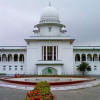Tirade Against SC: AL following in JP footsteps?

MPs in the current Parliament seem to have followed in footsteps of their predecessors in the fourth Jatiya Sangsad to launch an aggressive attack on the Supreme Court for scrapping a constitutional amendment.
Twenty-seven years ago, in the fourth Parliament controlled by Ershad-led autocratic government, MPs launched a broadside against the apex court and its judges for the verdict to partially scrap the eighth constitutional amendment.
In the discussion held in January 1990, Jatiya Party MPs used improper words against the SC judges in their free style speeches as the verdict delivered in September 1989 irked the then government.
After 27 years, in the current 10th Parliament, Awami League MPs launched a broadside on Sunday against the SC for scrapping the 16th amendment that had empowered the Parliament to remove apex court judges on grounds of misconduct or incapacity.
There are many similarities between the nature of the fourth and tenth Parliament which needs to be noted to understand the situation.
The fourth Parliament was formed following an election in March 1988 amid a boycott by Awami League, BNP and other parties. The then ruling JP won an easy landslide victory.
To give the Parliament a façade of legitimacy, the Ershad-led regime handpicked a so-called combined opposition party-led by ASM Abdur Rab. This act was widely ridiculed. All major pro-democratic parties termed that Rab-led alliance a 'pet opposition' of the then ruling JP.
A few months after the inauguration of the new Parliament, the eighth amendment to the constitution was brought by the Ershad government to consolidate its power.
The amendment introduced the provision for setting up some benches of the High Court outside of the capital and made Islam state religion.
The apex court in 1990 scrapped the provision for introduction of the circuit benches of the HC outside of the capital as it found the amendment against the independence of the judiciary.
Years later, long after the restoration of parliamentary democracy in the country, the 10th Parliament was formed following a one-sided parliamentary election held on January 5, 2014 amid a boycott by the BNP-led alliance and other parties.
The ruling AL easily won more than a three-fourth majority in the election by bagging 153 out of 300 seats uncontested. Only 18 candidates nominated by JP were elected uncontested in 1988 elections.
This time Ershad's JP was made a handpicked main opposition by the AL in Parliament. And after a few months of the inauguration of the new Parliament, the AL government brought the 16th amendment to restore the Parliament's power to remove the SC judges.
The SC declared the 16th amendment unconstitutional and void terming the constitutional changes illegal and unconstitutional. It found the changes went against the principles of the separation of powers and the independence of the judiciary.
But the present government policymakers were none too pleased. They discussed the issue in the Parliament. Honourable MPs toed the line of the ruling AL to castigate the SC in unison that had recently upheld a High Court verdict nullifying the amendment.
They did the same in May last year when the High Court declared the verdict.
The Speakers in the fourth and tenth Parliament played similar roles as well. Being the head of the legislature, one of the three organs of the state, they allowed MPs to make free style speeches against the judiciary, one other organ of the state.
The way they castigated the HC is not healthy for the proper functioning of the three organs of the state-- legislative, executive and the judiciary.
In both cases, the executive branch of the government joined hands with the legislature to castigate the judiciary. This is no way healthy for the proper functioning of the three organs.
Considering the sensitivity and importance of the judiciary, the constitution guarantees its independence as the article 94 (4) clearly states judges will be independent to discharge their functions.
Judicial independence allows judges to make decisions based on what is right under the law, without facing political and personal consequences for the decisions they make.
A number of sections of the rules of procedure of JS including sections 133 and 270 (iii) prohibits MPs from making sweeping statements or derogatory remarks about the judiciary and judges.
If any MP tries to make any derogatory remarks against the judiciary, it is the duty of the Speaker to prevent the MP from doing so. The Speaker is oath bound to preserve, protect and defend the constitution.
Unfortunately, whenever the ruling party MPs castigate the judiciary, the Speaker does not act to stop the attack. The head of the legislature puts the party before the House as MPs always do the same due to the restriction imposed on them by the article 70 of the constitution.
It is the constitution that has given its guardianship to the SC. The SC has also been given the power of judicial review by article 102 of the constitution. In exercise of this power, the apex court can strike down any law for inconsistency with any provision of the constitution.
And in exercise of this authority, the SC has scrapped some constitutional amendments and some other legislations enacted by the Parliament.
But if MPs aggrieved by an SC verdict launch broadside against the apex court and its judges, this may be considered as transgression of their boundary and abuse of their Parliamentary immunities and privileges.
Those MPs who have launched the attack on the SC for cancellation of the eighth and 16th amendment seem to have crossed their limits set by the constitution.
The similarity of the fourth and tenth Parliament and the way the JS performs says a lot about democratic practices. Imbalance of power always poses a risk for democracy.

 For all latest news, follow The Daily Star's Google News channel.
For all latest news, follow The Daily Star's Google News channel. 








Comments